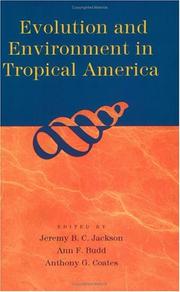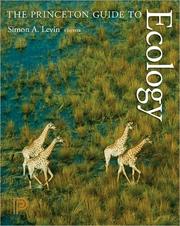| Listing 1 - 9 of 9 |
Sort by
|
Book
ISBN: 9780300235036 0300235038 0300179391 9780300179392 Year: 2018 Publisher: New Haven
Abstract | Keywords | Export | Availability | Bookmark
 Loading...
Loading...Choose an application
- Reference Manager
- EndNote
- RefWorks (Direct export to RefWorks)
An insightful look at the American environmental crisis and emerging solutions from the heartland to the coasts in the era of global climate change Eminent ecologist Jeremy B. C. Jackson and award-winning journalist Steve Chapple traveled the length of the Mississippi River interviewing farmers, fishermen, scientists, and policymakers to better understand the mounting environmental problems ravaging the United States. Along their journey, which quickly expands to California, Florida, and New York, the pair uncovered surprising and profound connections between ecological systems and environmental crises across the country. Artfully weaving together independent research and engaging storytelling, Jackson and Chapple examine the looming threats from recent hurricanes and fires, industrial agriculture, river mismanagement, extreme weather events, drought, and rising sea levels that are pushing the country toward the breaking point of ecological and economic collapse. Yet, despite these challenges, the authors provide optimistic and practical solutions for addressing these multidimensional issues to achieve greater environmental stability, human well-being, and future economic prosperity. With a passionate call to action, they look hopefully toward emerging and achievable solutions to preserve the country's future.
E-books --- Environmental policy --- Environmental degradation --- Environmental disasters --- Ecology --- Economic aspects
Book
ISBN: 0300036507 Year: 1986 Publisher: New Haven (Conn.): Yale university
Abstract | Keywords | Export | Availability | Bookmark
 Loading...
Loading...Choose an application
- Reference Manager
- EndNote
- RefWorks (Direct export to RefWorks)
Book
ISBN: 0300235038 Year: 2018 Publisher: New Haven, CT : Yale University Press,
Abstract | Keywords | Export | Availability | Bookmark
 Loading...
Loading...Choose an application
- Reference Manager
- EndNote
- RefWorks (Direct export to RefWorks)
An insightful look at the American environmental crisis and emerging solutions from the heartland to the coasts in the era of global climate change Eminent ecologist Jeremy B. C. Jackson and award-winning journalist Steve Chapple traveled the length of the Mississippi River interviewing farmers, fishermen, scientists, and policymakers to better understand the mounting environmental problems ravaging the United States. Along their journey, which quickly expands to California, Florida, and New York, the pair uncovered surprising and profound connections between ecological systems and environmental crises across the country. Artfully weaving together independent research and engaging storytelling, Jackson and Chapple examine the looming threats from recent hurricanes and fires, industrial agriculture, river mismanagement, extreme weather events, drought, and rising sea levels that are pushing the country toward the breaking point of ecological and economic collapse. Yet, despite these challenges, the authors provide optimistic and practical solutions for addressing these multidimensional issues to achieve greater environmental stability, human well-being, and future economic prosperity. With a passionate call to action, they look hopefully toward emerging and achievable solutions to preserve the country's future.
Environmental policy --- Environmental degradation --- Environmental disasters --- Ecology --- Economic aspects
Book
ISBN: 161091001X 1610910001 9786613354051 1283354055 161091029X 1597262102 Year: 2011 Publisher: Washington, DC : Island Press/Center for Resource Economics : Imprint: Island Press,
Abstract | Keywords | Export | Availability | Bookmark
 Loading...
Loading...Choose an application
- Reference Manager
- EndNote
- RefWorks (Direct export to RefWorks)
Shifting Baselines explores the real-world implications of a groundbreaking idea: we must understand the oceans of the past to protect the oceans of the future. In 1995, acclaimed marine biologist Daniel Pauly coined the term "shifting baselines" to describe a phenomenon of lowered expectations, in which each generation regards a progressively poorer natural world as normal. This seminal volume expands on Pauly's work, showing how skewed visions of the past have led to disastrous marine policies and why historical perspective is critical to revitalize fisheries and ecosystems. Edited by marine ecologists Jeremy Jackson and Enric Sala, and historian Karen Alexander, the book brings together knowledge from disparate disciplines to paint a more realistic picture of past fisheries. The authors use case studies on the cod fishery and the connection between sardine and anchovy populations, among others, to explain various methods for studying historic trends and the intricate relationships between species. Subsequent chapters offer recommendations about both specific research methods and effective management. This practical information is framed by inspiring essays by Carl Safina and Randy Olson on a personal experience of shifting baselines and the importance of human stories in describing this phenomenon to a broad public. While each contributor brings a different expertise to bear, all agree on the importance of historical perspective for effective fisheries management. Readers, from students to professionals, will benefit enormously from this informed hindsight.
Fisheries --- Fishery management --- Agriculture --- Earth & Environmental Sciences --- Animal Sciences --- Ecology --- History --- Fish management --- Fisheries management --- Fishery resources --- Coastal fisheries --- Commercial fisheries --- Commercial fishing industry --- Farms, Fish --- Fish farms --- Fishery industry --- Fishery methods --- Fishing industry --- Freshwater fisheries --- Inland fisheries --- Large-scale fisheries --- Marine fisheries --- Marine recreational fisheries --- Recreational fisheries --- Sea fisheries --- Sea fishing industry --- Sport fisheries --- Management --- Environment. --- Ecosystems. --- Aquatic ecology. --- Wildlife. --- Fish. --- Environmental law. --- Environmental policy. --- Marine sciences. --- Freshwater. --- Marine & Freshwater Sciences. --- Freshwater & Marine Ecology. --- Environmental Law/Policy/Ecojustice. --- Fish & Wildlife Biology & Management. --- Marine Sciences. --- Aquatic biology. --- Endangered ecosystems. --- Wildlife management. --- Environment law --- Environmental control --- Environmental protection --- Environmental quality --- Environmental policy --- Law --- Sustainable development --- Threatened ecosystems --- Biotic communities --- Nature conservation --- Animal populations --- Game management --- Management, Game --- Management, Wildlife --- Plant populations --- Wildlife resources --- Natural resources --- Wildlife conservation --- Hydrobiology --- Water biology --- Aquatic sciences --- Biology --- Ocean sciences --- Law and legislation --- Aquatic ecology . --- Fish --- Pisces --- Aquatic animals --- Vertebrates --- Fishing --- Ichthyology --- Environment and state --- Environmental management --- State and environment --- Environmental auditing --- Biocenoses --- Biocoenoses --- Biogeoecology --- Biological communities --- Biomes --- Biotic community ecology --- Communities, Biotic --- Community ecology, Biotic --- Ecological communities --- Ecosystems --- Natural communities --- Population biology --- Aquatic biology --- Fresh waters --- Freshwater --- Freshwaters --- Inland water --- Inland waters --- Water --- Government policy

ISBN: 0226389448 0226389421 Year: 1996 Publisher: Chicago The University of Chicago Press
Abstract | Keywords | Export | Availability | Bookmark
 Loading...
Loading...Choose an application
- Reference Manager
- EndNote
- RefWorks (Direct export to RefWorks)
Paleoecology --- Palaeoecology --- Quaternary Period --- Ecology --- Paleobiology
Digital
ISBN: 9781610910293 Year: 2011 Publisher: Washington, DC Island Press/Center for Resource Economics
Abstract | Keywords | Export | Availability | Bookmark
 Loading...
Loading...Choose an application
- Reference Manager
- EndNote
- RefWorks (Direct export to RefWorks)
Environmental law --- Nature protection --- General ecology and biosociology --- Hunting. Fishery. Aquaculture --- natuurbeheer --- aquacultuur --- ecologie --- wetenschappen --- milieurecht --- milieupolitiek --- ecosystemen
Book
ISBN: 9781610910293 Year: 2011 Publisher: Washington, DC Island Press/Center for Resource Economics
Abstract | Keywords | Export | Availability | Bookmark
 Loading...
Loading...Choose an application
- Reference Manager
- EndNote
- RefWorks (Direct export to RefWorks)
Shifting Baselines explores the real-world implications of a groundbreaking idea: we must understand the oceans of the past to protect the oceans of the future. In 1995, acclaimed marine biologist Daniel Pauly coined the term "shifting baselines" to describe a phenomenon of lowered expectations, in which each generation regards a progressively poorer natural world as normal. This seminal volume expands on Pauly's work, showing how skewed visions of the past have led to disastrous marine policies and why historical perspective is critical to revitalize fisheries and ecosystems. Edited by marine ecologists Jeremy Jackson and Enric Sala, and historian Karen Alexander, the book brings together knowledge from disparate disciplines to paint a more realistic picture of past fisheries. The authors use case studies on the cod fishery and the connection between sardine and anchovy populations, among others, to explain various methods for studying historic trends and the intricate relationships between species. Subsequent chapters offer recommendations about both specific research methods and effective management. This practical information is framed by inspiring essays by Carl Safina and Randy Olson on a personal experience of shifting baselines and the importance of human stories in describing this phenomenon to a broad public. While each contributor brings a different expertise to bear, all agree on the importance of historical perspective for effective fisheries management. Readers, from students to professionals, will benefit enormously from this informed hindsight.
Environmental law --- Nature protection --- General ecology and biosociology --- Hunting. Fishery. Aquaculture --- natuurbeheer --- ecologie --- wetenschappen --- milieurecht --- milieupolitiek --- ecosystemen
Book

ISBN: 9962651123 9789962651123 Year: 2006 Publisher: Panamá Editora Novo Art
Abstract | Keywords | Export | Availability | Bookmark
 Loading...
Loading...Choose an application
- Reference Manager
- EndNote
- RefWorks (Direct export to RefWorks)
ECO Ecology --- ecology --- tropical regions


ISBN: 1782682961 1282692135 9786612692130 184972699X 1400833027 0691128391 0691156042 9781400833023 0391128396 9780391128392 9780691156040 9780691128399 9781782682967 9781282692138 6612692138 9781849726993 Year: 2009 Publisher: Princeton, NJ
Abstract | Keywords | Export | Availability | Bookmark
 Loading...
Loading...Choose an application
- Reference Manager
- EndNote
- RefWorks (Direct export to RefWorks)
The Princeton Guide to Ecology is a concise, authoritative one-volume reference to the field's major subjects and key concepts. Edited by eminent ecologist Simon Levin, with contributions from an international team of leading ecologists, the book contains more than ninety clear, accurate, and up-to-date articles on the most important topics within seven major areas: autecology, population ecology, communities and ecosystems, landscapes and the biosphere, conservation biology, ecosystem services, and biosphere management. Complete with more than 200 illustrations (including sixteen pages in color), a glossary of key terms, a chronology of milestones in the field, suggestions for further reading on each topic, and an index, this is an essential volume for undergraduate and graduate students, research ecologists, scientists in related fields, policymakers, and anyone else with a serious interest in ecology. Explains key topics in one concise and authoritative volume Features more than ninety articles written by an international team of leading ecologists Contains more than 200 illustrations, including sixteen pages in color Includes glossary, chronology, suggestions for further reading, and index Covers autecology, population ecology, communities and ecosystems, landscapes and the biosphere, conservation biology, ecosystem services, and biosphere management
Ecology. --- Ecology --- Economic aspects. --- Ecological economics --- Balance of nature --- Biology --- Bionomics --- Ecological processes --- Ecological science --- Ecological sciences --- Environment --- Environmental biology --- Oecology --- Electronic monograph. --- Environmental sciences --- Population biology
| Listing 1 - 9 of 9 |
Sort by
|

 Search
Search Feedback
Feedback About UniCat
About UniCat  Help
Help News
News